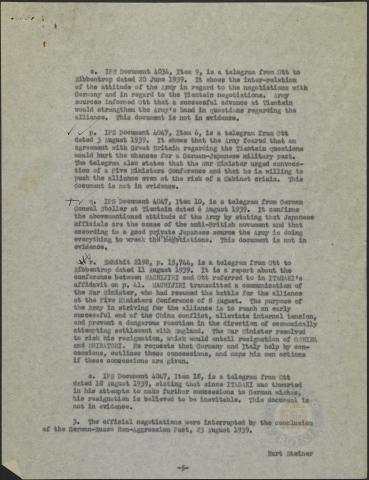
Page 5
| Parent | Japanese Negotiations with Germany and ITAGAKI's attitude in regard to them |
|---|---|
| Date | 6 October 1946 |
| Language | English |
| Collection | Tavenner Papers & IMTFE Official Records |
| Box | Box 3 |
| Folder | General Reports and Memoranda October 1946 |
| Repository | University of Virginia Law Library |
o. IPS Document 4034, Item 9, is a telegram from Ott to Ribbentrop dated 20 June 1939. It shows the
inter-relation of the attitude of the Army in regard to the negotiations with Germany and in regard to
the Tientsin negotiation. Army sources informed Ott that such a successful advance at Tientsin would
strengthen the Army’s hand in questions regarding the alliance. This document is not in evidence.
p. IPS Document 4047, Item 6, is a telegram from Ott dated 3 August 29 1939. It shows that the Army
feared that an agreement with Great Britain regarding the Tientsin questions would hurt the chances
for a German-Japanese military pact. The telegram also states that the War Minister urged convocation
of a Five Ministers Conference and that he is willing to push the alliance even at the risk of a Cabinet
crisis. This document is not in evidence.
q. IPS Document 4047, Item 10, is a telegram from German Consul Stoller at Tientsin dated 6 August 1939. It confirms the above mentioned attitude of the Army by stating that Japanese officials are the cause of the anti-British movement and that according to a good private Japanese source the Army is doing everything to wreck the Tientsin negotiations. This document is not in evidence.
r. Exhibit 2198, p. 15,744, is a telegram from Ott to Ribbentrop dated 11 August 1939. It is a report about the conference between MACHIJIRI and Ott referred to in ITAGAKI’s affidavit on p. 41. MACHIJIRI transmitted a communication of the War Minister, who had resumed the battle for the alliance at the Five Ministers Conference of 8 August. THE purpose of the Army in striving for the alliance is to reach an early successful end of the China conflict, alleviate internal tension, and prevent a dangerous reaction in the direction of economically attempting settlement with England. The War Minister resolved to risk his resignation, which would entail resignation of OSHIMA and SHIRATORI. He requests t hat Germany and Italy help by concessions, outlines these concessions, and maps his own actions if these concessions are given.
s. IPS Document 4047, Item 1S, is a telegram from Ott dated 18 August 1939, stating that since ITAGAKI was thwarted in his attempts to make further concessions to German wishes, his resignation is believed to be inevitable. This document is not in evidence.
3. The official negotiations were interrupted by the conclusion of the German-Russo Non-Aggression Pact, 23 August 1939.
Kurt Steiner
-5-
